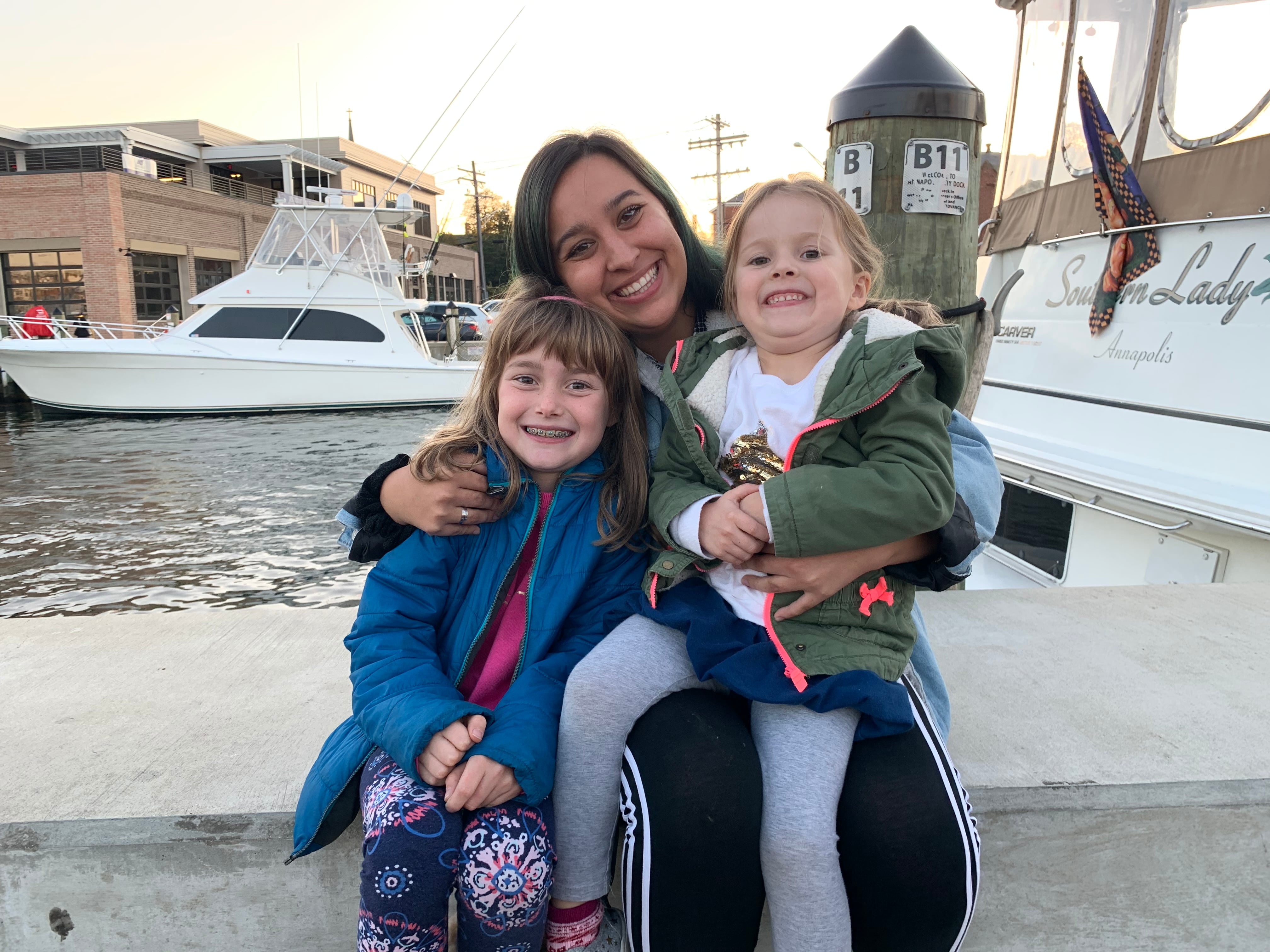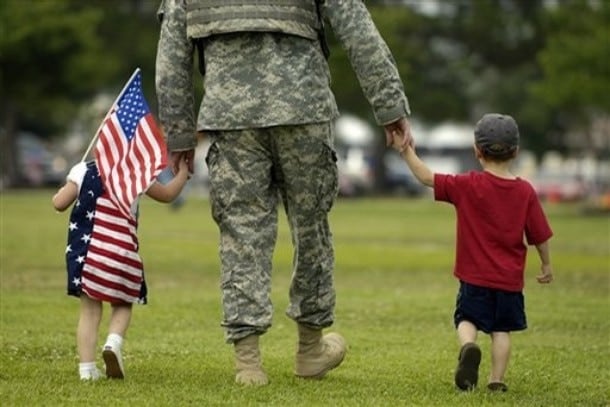I have spent the last 11 years serving as an active duty military spouse while also trying to prioritize my own career. My husband and I believed that raising our children with a second language would not only be a gift to expand their curious minds but essential to their understanding and respect of a world beyond the United States of America. As a Navy pilot, my husband’s presence in our home has been a revolving door. He has been called to move personnel and cargo around the world, sometimes at a moment’s notice. He is also the German speaker in our home, so when he isn’t here, the second language comes to a halt. Four years ago, we made the decision for our family to host an au pair not only for language continuity but to give us childcare flexibility to support my career.
We were looking forward to welcoming our fifth German au pair this summer until the president announced last Monday afternoon that J-1 visas for au pairs would be put on hold until at least the end of 2020. This was devastating news to us and many other host families expecting to welcome new au pairs during the summer months. This leaves my family without consistent childcare for the second half of 2020 at a time when all Americans are getting back to work and child care centers are in high demand.
RELATED

The summer months are an especially busy time for welcoming au pairs as the kids are on summer break and families often have a bit more flexibility to take a few days to orient and train a new housemate and childcare provider. Due to U.S. embassy and consulate closures around the world, incoming au pairs have not been able to obtain a visa appointment for the past few months, in some cases since early 2020. This ban will create almost a year-long gap without welcoming new au pairs into the country upon which many families have come to depend.
Erin Harper, founder and CEO of The Upside, made an excellent economic case for why banning au pairs from entering the country does not support working class families. Additionally, Erin makes the case that this policy discriminates against working mothers (who make up the majority of the military spouse community), thus impacting military readiness, family readiness, long-term retention goals and further exacerbates military spouse unemployment. Even pre-COVID military spouse unemployment was already at an astronomical rate of 24 percent unemployment and 31 percent under employment as reported by A Collective Effort for Military Spouses report. From their 2017 Hiring Our Heroes report, “Eighty-one percent of military spouses and their servicemember have discussed the possibility of leaving the service, with the availability of career opportunities for both spouses cited as the top deciding factor.” These numbers were so significant it already has gained the attention and support of the current administration, specifically the Second Lady’s Office. Supporting veterans and military families is a priority of this administration so I am asking them to reconsider the impact this visa ban is disproportionally having on the military community who comprise approximately 10 percent of host families overall. Au pair agencies are reporting a significant demand for their services since COVID-19, especially the military community, many of whom are essential personnel.
Au pairs provide safety
There is nothing safer and more stable than having live-in childcare during the time of a global pandemic. Dr. Anthony Fauci, director of the National Institute of Allergy and Infectious Disease, is on the record saying, “He would like a ‘dramatic’ reduction of personal interactions” to help combat the coronavirus. Hosting an au pair is one of the best ways to reduce your risk of exposure, ensure the safety of your family while still being present at your job. Many military families, especially dual-military couples, host au pairs to support the demanding hours required of a military career. Hiring a nanny or babysitter to watch your children means expanding your social circle significantly as they come and go from your home every day. The au pair program provides stability, peace of mind and provides less risk of infection to military families since they know exactly where their childcare providers have been during their off hours … mostly in their home.
In a military moms group, one mom wrote: “My husband and I are both essential workers, specifically doctors, and we already can’t find a daycare with a spot for a new child due to COVID restrictions when we PCS (Permanent Change of Station). Our au pair has been a lifesaver to both of our sanity knowing our son was cared for while we cared for others.”
Au pairs provide consistency for military children
The summertime is PCS season and many families have received orders to start at a new command. The pandemic has already created massive amounts of uncertainty as the Department of Defense has enforced travel bans and postponed PCS orders to do their part in flattening the curve and protecting the overall readiness of our armed forces. This has put some families in temporary housing, living out of boxes and with an uncertain place to call “home.”
Fortunately our military families are resilient along with our military kids. But that doesn’t mean we need to pile on to the instability. The National Military Family Association reports that military-connected students “will attend between six to nine schools between kindergarten and their senior year of high school.” Military-connected kids watch their parents come and go, sometimes for long periods of time as they deploy or serve overseas, and parents are required to have a continuity of care plan or family care plan in place at all times. Au pairs contribute to these plans as the J-1 visa permits them to remain in the country for up to two years, providing caregiver continuity for families. Many families count on welcoming incoming au pairs at their new duty stations to help provide stability for the children while they set up their new homes and get settled in the community. Au pairs also have the unique flexibility to move with a military family to a new duty station. It allows for peace of mind for parents to not have to search for a trusted caregiver along with all the other new things that must be established when moving to a new town and starting a new job.
One military family, who just welcomed their third child is moving from Indiana to Northern Virginia this summer. He is an active duty Army major and she is a leading executive at a veteran-serving organization. She is finishing up her maternity leave, and after getting settled in their new home, planned to welcome their next au pair and expected to go back to work full-time. Now their au pair can no longer join them until at least January 2021 per the administration’s executive order. Northern Virginia has a higher cost of living, so they are already paying more for housing, their older two children likely won’t attend school in the fall, and they are now faced with an unknown child care situation.
A cross-country move, new home, new life, new school, and constantly rotating childcare providers does not provide the stability that military children so desperately crave and need in a lifestyle over which they have no control. The COVID-19 Military Service Initiative reports in their Pain Points Poll about Childcare “COVID-19 presents unique challenges and renders some command approved family care plans untenable. Despite efforts to provide childcare for mission essential personnel, one-fifth of mission essential respondents reported they were unable to access it.” Even pre-COVID, in the 2019 Blue Star Families Survey reported that, “72% of families cannot obtain reliable childcare.”
If the second wave of coronavirus hits the United States, Childcare Development Centers (CDCs), daycares and schools will likely close again. The Collective Effort For Military Spouse also reports “In some locations, particularly those with high concentrations of service members (such as Norfolk, San Diego, Honolulu, and San Antonio), as well as large metropolitan areas, wait lists for childcare can average six months or more” making it virtually impossible to access care after a PCS. As our great advocacy and programming organizations supporting military families, National Military Family Association and Blue Star Families always say, “Family readiness is military readiness.”
If hosting au pairs are taken away from families as an affordable childcare option, especially military families, they will not simply turn around and create jobs in an equivalent home-grown economy. The opposite will be true. Spouses will be forced to quit their jobs and/or accept direct negative impacts upon military readiness; lose, lose.
The challenges are real, the stressors are real and in a time of global health uncertainty we need to pursue every channel to support the readiness of our military and get Americans back to work, which includes supporting flexible childcare programs like the J-1 visa au pair program.
If supporting veterans and military families is truly a priority of this administration, in addition to innovative policies supporting affordable childcare, I urge the administration to reconsider the impact this visa ban is disproportionally having on the military community and working mothers across America.
Kelly Finn Störmer is a Navy veteran, very recently retired military spouse, au pair host mom, mom to three crazy little boys, chief operating officer of the National Association of Veteran-Serving Organizations (NAVSO), 2020-2021 Presidential Leadership Scholar and passionate about advancing positive outcomes for the military and veteran communities.
Editor’s note: This is an Op-Ed and as such, the opinions expressed are those of the author. If you would like to respond, or have an editorial of your own you would like to submit, please contact Military Times managing editor Howard Altman, haltman@militarytimes.com.





